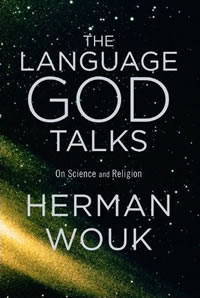Book Notes
 Herman Wouk, The Language God Talks; On Science and Religion (New York: Little, Brown and Company, 2010), 183pp.
Herman Wouk, The Language God Talks; On Science and Religion (New York: Little, Brown and Company, 2010), 183pp.
Fifty years ago when the Jewish novelist Herman Wouk (born 1915) was researching his books The Winds of War (1971) and War and Remembrance (1978), he met with the famous Caltech physicist Richard Feynman to learn about the Manhattan Project and the atom bomb. "Do you know calculus?" Feynman asked the humanist Wouk. "You had better learn it," said Feynman, "it's the language God talks." Wouk tried but never did learn calculus, but he later had two more conversations with Feynman at the Aspen Institute.
Wouk has been ruminating about those conversations ever since, and in particular about an off-the-cuff remark that Feynman made in a television interview which later became a famous sound bite, to explore the relationship between religion and science. In the interview Feynman expounded an agnostic or atheist outlook: "It doesn't seem to me that this fantastically marvelous universe, this tremendous range of time and space and different kinds of animals, and all the different planets, and all these atoms with all their motions, and so on, all this complicated thing can merely be a stage so that God can watch human beings struggle for good and evil — which is the view that religion has. The stage is too big for the drama."
No, Wouk amicably objects, the stage is not too big. He might not know calculus, but he insists that he knows God's "other language" in the Talmud. He fondly recollects his upbringing as a Russian immigrant in the Bronx and studying the Torah with his grandfather once a week. Even today Wouk reads the Hebrew Scriptures daily. Science, too, is part of our messy human drama of doubt, error, vanity, ignorance, ridicule and politics. It depends upon faith in the opinions of elite authorities, which opinions often disagree about fundamental matters ("No one understands quantum mechanics," Feynman once said.). It can build the atom bomb but provide precious little moral wisdom about its use, or explain the magic of genetics but not how to raise a teenager.
Has the last 15 billion years really been such a "vastly drawn-out complex purposeless nonsense?" asks Wouk. "I'll venture that not even a solid savant like Steven Weinberg can believe that, not in his innermost soul." Art, human joy and sorrow, the mystery of human consciousness, all these hints do not "prove" anything but nevertheless suggest that our human drama does indeed have an overall Plot and Author. In his final pages Wouk offers an imaginary fourth conversation with Feynman, and then a coda of what he believes.
Dan Clendenin: dan@journeywithjesus.net


